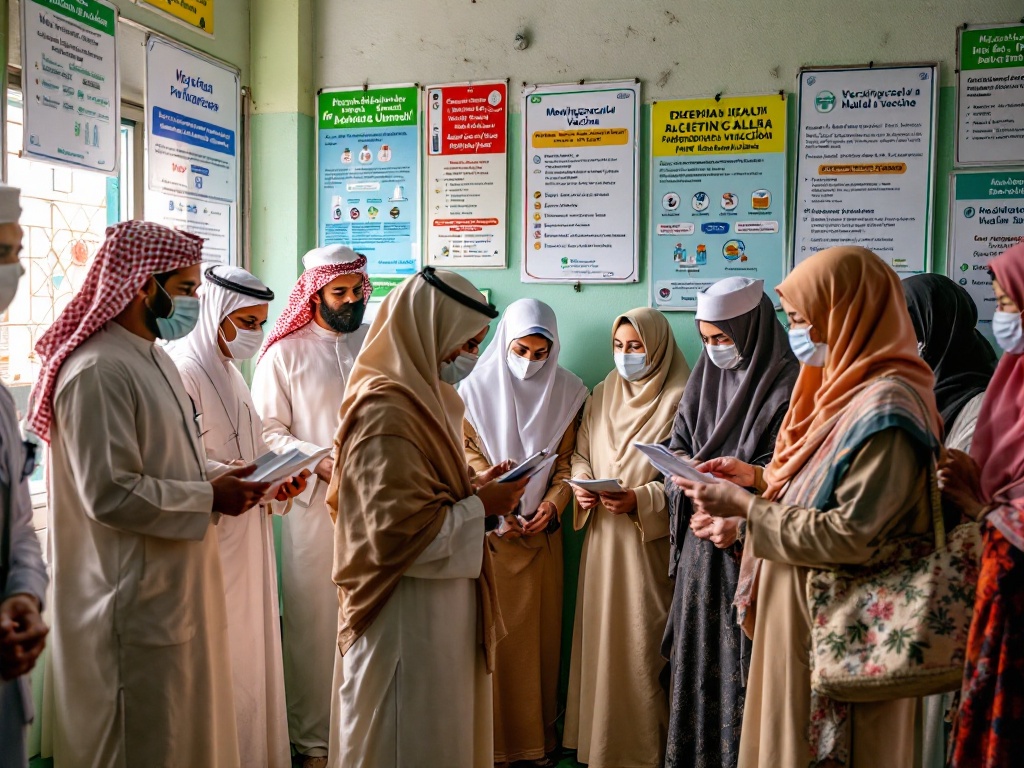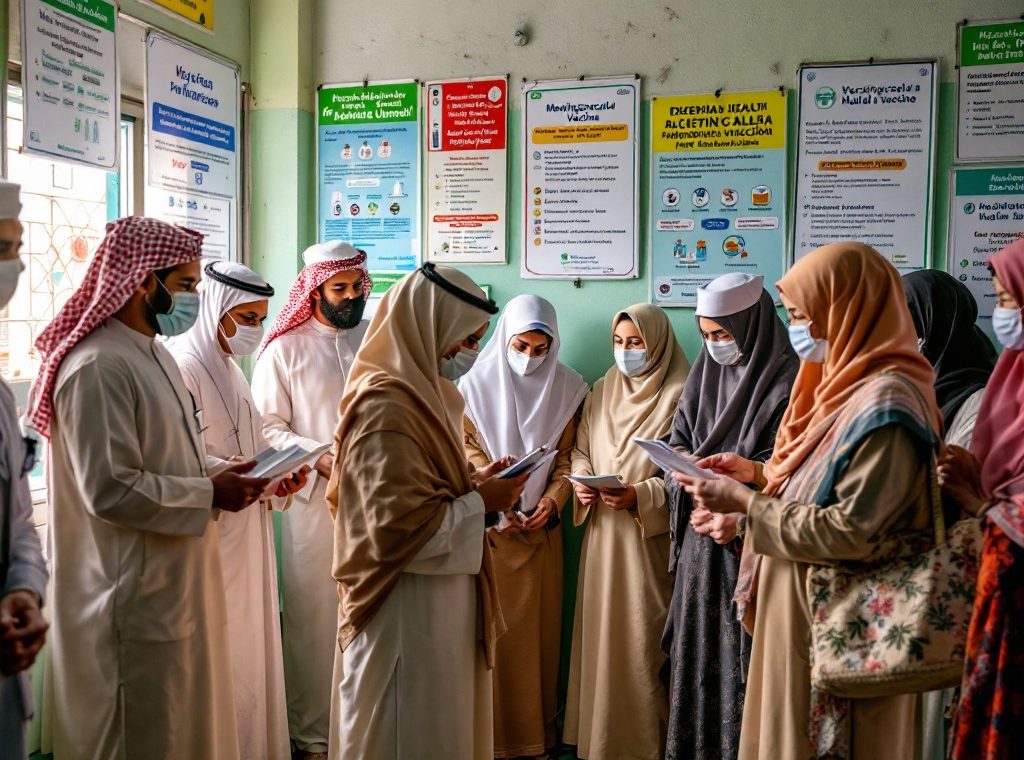Hajj and Umrah Health Requirements: What You Need to Know
Planning your Hajj or Umrah? Safeguarding your health is paramount. The Saudi Ministry of Health mandates essential vaccinations, including the meningococcal vaccine (ACYW-135), especially for pilgrims one year and older. Protect yourself from yellow fever and polio, especially if traveling from at-risk regions. Enhance your well-being by getting the seasonal flu shot. Learn about crucial health precautions, hygiene practices, and access to medical facilities. Prepare for a healthy pilgrimage. Read on to learn more about these vital requirements and recommendations.
Important information

- Meningococcal (ACYW-135) vaccination is required for all pilgrims.
- Yellow fever vaccination is required for travelers arriving from at-risk countries.
- The polio vaccine and seasonal flu vaccine are strongly recommended.
- Pilgrims should practice good hygiene, stay hydrated, and avoid overexertion.
- Consult your doctor before traveling, especially if you have a chronic illness.
Understanding Hajj and Umrah Health Requirements
The Ministry of Health has established important health regulations for Hajj and Umrah pilgrims. These include required vaccinations and medical clearances. These measures help ensure pilgrims can safely participate in religious activities while protecting their well-being.
Entry Visa and Mandatory Health Requirements
Entry visas for Hajj and Umrah require pilgrims to meet specific health requirements established by the Saudi Ministry of Health. Proof of vaccination is mandatory.
Vaccination Procedures for Entry
Meningococcal disease (ACYW-135) vaccination proof is required. A valid yellow fever vaccination certificate is also necessary for travelers arriving from countries with a yellow fever risk.
Medical Clearance for Pilgrims
For the safety of all, the Ministry of Health requires Hajj pilgrims to be in good health.
Essential Vaccinations for Hajj and Umrah
Meningococcal Meningitis Vaccine (Quadrivalent ACYW-135)
This vaccine is required for all pilgrims and protects against four types of meningococcal bacteria (A, C, Y, and W-135) that can cause meningitis, a severe infection of the brain and spinal cord.
Polio Vaccine
While not mandatory, this vaccine is strongly recommended, especially for pilgrims from regions where polio is still present. It is available in oral and injectable forms and protects against poliomyelitis, a highly contagious disease that can cause paralysis.
Yellow Fever Vaccine
Required if you are traveling from a country with a risk of yellow fever, as designated by the World Health Organization (WHO). This vaccine protects against this mosquito-borne viral illness.
Seasonal Influenza Vaccine
This vaccine is recommended for all pilgrims to prevent the spread of influenza, a contagious respiratory illness easily transmittable in large groups.
Consult Your Doctor
For personalized advice tailored to your health needs and travel itinerary, please consult your doctor.
Meningococcal Vaccine: Quadrivalent ACYW-135
This vaccine protects against four types of meningococcal disease (serogroups A, C, Y, and W-135). Travelers one year and older going to Saudi Arabia must receive this vaccine at least ten days prior to arrival.
Polio Vaccine: Oral and Injectable Options
Travelers from polio-affected areas must receive the oral polio vaccine (OPV) at least four weeks before arriving in Saudi Arabia. This is a mandatory requirement.
Yellow Fever Vaccine: Who Needs It?
Travelers from countries with a yellow fever risk must be vaccinated and carry a valid International Certificate of Vaccination or Prophylaxis (ICVP) as proof. This precaution ensures your safety during your travels.
Seasonal Influenza Vaccine: Recommendations
The Saudi Ministry of Health strongly encourages international pilgrims to receive the seasonal flu vaccine. This precaution helps protect vulnerable individuals and prevent widespread flu transmission during the Hajj and Umrah pilgrimages.
Health Precautions and Preventive Measures
Staying healthy during your pilgrimage is crucial. Prioritize hydration, especially in extreme weather. Maintain good personal hygiene by frequently using hand sanitizer. Avoid close contact with those who appear ill. Carry a personal medical kit and know the locations of nearby medical facilities.
- Frequently clean your hands, especially after being in crowded areas.
- Wear a mask in crowded settings to reduce the risk of respiratory infections.
- Stay properly hydrated and consume safe food.
- Avoid excessive sun exposure, rest regularly, and pace yourself to prevent overexertion.
Before your pilgrimage, consult your doctor for a check-up. Ensure your vaccinations are current, especially for meningitis and influenza. Pack a comprehensive travel health kit with essential medications, first aid supplies, and any necessary medical devices. Familiarize yourself with common illness symptoms and understand how to access healthcare in emergencies. These pre-trip preparations will contribute to a safer and healthier pilgrimage.
Public Health Guidelines for Pilgrims
Practice frequent handwashing. In crowded areas, consider wearing a mask.
Stay hydrated. Drink plenty of water and choose safe food options.
Avoid prolonged sun exposure. Rest regularly to prevent overexertion.
Adhere to all COVID-19 guidelines. This may include vaccination, testing, and masking requirements. Social distancing and maintaining good hygiene practices will minimize your risk of infection.
Preventive Health Measures at Points of Entry
During meningitis outbreaks, border officials may offer travelers preventive antibiotics to safeguard against infection.
Managing Chronic Conditions During Pilgrimage
Before embarking on Hajj or Umrah with a chronic illness, consult your doctor. Bring a comprehensive medical report detailing your condition, treatment plan, current medications, allergies, and emergency contact information. Pack an adequate supply of your prescribed medications, along with copies of your prescriptions. Familiarize yourself with healthcare facilities in the area. Consider traveling with a companion who understands your health needs and can provide assistance if necessary.
Travel Precautions Against Respiratory Infections
Wash your hands frequently
Frequent handwashing is key to preventing the spread of germs.
Wear a mask in crowded areas
In crowded areas, a mask offers protection against respiratory infections.
Avoid contaminated food and water
Be sure to avoid contaminated food and water.
Consult a doctor if you feel unwell
If you begin feeling unwell, consult a doctor immediately.
Stay hydrated and avoid overexertion
Staying hydrated and avoiding overexertion will also contribute to your overall health.
Health Education and Information for Pilgrims
Health authorities prioritize pilgrim safety by providing essential health information and resources. They offer crucial education on health risks and necessary precautions through various channels, covering vital aspects such as: hygiene, vaccinations, and preventing infectious diseases. Pilgrims also receive guidance on accessing healthcare and managing pre-existing conditions during their pilgrimage. This empowers them to stay healthy throughout their journey.
Role of Health Authorities in Pilgrim Education
Public health authorities are advising pilgrims about infectious diseases in Saudi Arabia and recommending necessary vaccinations, such as those for meningococcal disease and seasonal flu. They also highlight preventive measures like regular handwashing and good respiratory hygiene to protect public health.
Public Health Risk and Safety Measures
Hajj and Umrah pose significant public health challenges, especially the transmission of infectious diseases such as meningitis and respiratory infections. Saudi health authorities prioritize pilgrim safety, implementing various protective measures, particularly during public health emergencies. These measures include heightened surveillance, quarantine protocols, and improved sanitation at holy sites, all intended to protect pilgrims’ health.

















